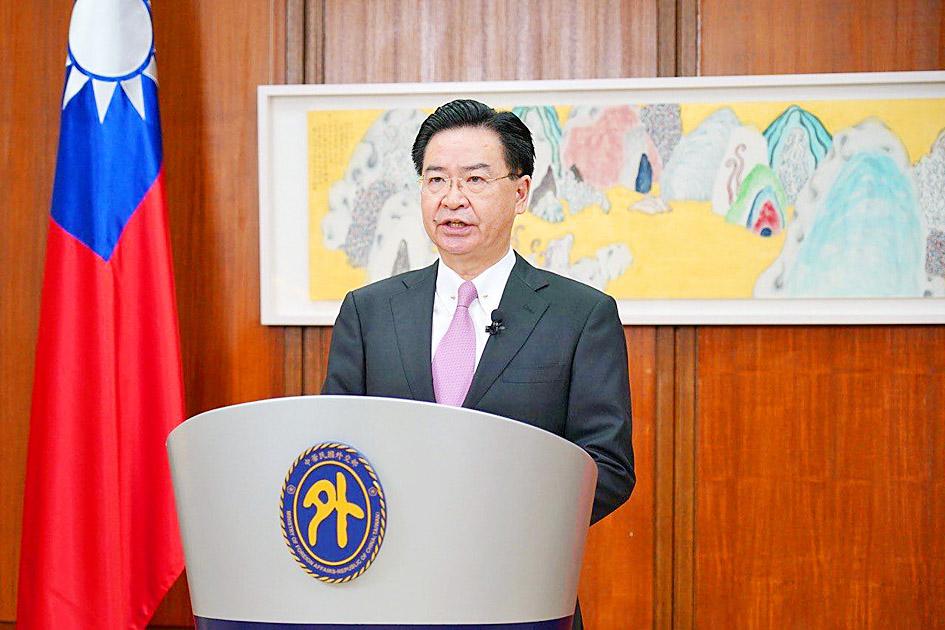China is undermining human rights and the international order, Minister of Foreign Affairs Joseph Wu (吳釗燮) told a seminar in Ottawa on Thursday.
“Most of the challenges we face today have one common component: that is China,” Wu told the event, which was hosted by the University of Ottawa’s Human Rights Research and Education Centre two days before the anniversary of the Tiananmen Square Massacre.
“In recent years, the Chinese Communist Party has accelerated its authoritarian agenda both at home and abroad,” he said in a prerecorded speech, citing human rights abuses in Xinjiang, Tibet and Hong Kong, as well as a COVID-19-related lockdown in Shanghai.

Photo courtesy of the Ministry of Foreign Affairs
“The authoritarian regime that wrote the bloody history of the Tiananmen Massacre 33 years ago is no better today than it was back then,” Wu said. “In fact, It is now stronger, smarter, more ruthless and better equipped with economic power and technological capabilities.”
These capabilities enable China to undermine democracies around the world, using its military, diplomatic and economic coercion, spreading fake news, and attacking the structure of free trade, he said.
Beijing has colluded with Russia over Moscow’s war against Ukraine by providing it diplomatic cover and conducting a joint strategic bomber patrol near Japan on Tuesday last week, coinciding with US President Joe Biden’s visit to East Asia, he said.
Taiwan’s response to the crisis in Ukraine was to promptly donate US$33 million in financial assistance, as well as humanitarian and medical supplies, he said, adding that a substantial portion of the supplies were donated by members of the public.
Wu also lauded Canada’s role in bolstering the multinational effort to counter authoritarian expansion.
“Taiwan will always be your [Canada’s] most loyal partner” in the fight to safeguard democracy, he said.
“In cooperation with Canada and other like-minded countries, Taiwan defends the universal values of freedom, democracy and human rights, despite nonstop coercion from China,” he said.
Wu said Taiwan’s high-tech sector is crucial to international efforts to restructure global supply chains after COVID-19 shutdowns exposed their dependency on China.
He urged Canada to support Taiwan’s bid to join the Comprehensive and Progressive Agreement for Trans-Pacific Partnership, saying that the nation meets the trade bloc’s standards.
The Asia-Pacific region would benefit from its accession, he added.
Wu thanked the event’s organizers and participants, saying: “Taiwan and my ministry stand ready with you in every possible way to advance our shared cause.”
“By working together, we can deter the challenge of authoritarianism, safeguard democracy and human rights, and build a more stable and prosperous world,” Wu said.

Left-Handed Girl (左撇子女孩), a film by Taiwanese director Tsou Shih-ching (鄒時擎) and cowritten by Oscar-winning director Sean Baker, won the Gan Foundation Award for Distribution at the Cannes Critics’ Week on Wednesday. The award, which includes a 20,000 euro (US$22,656) prize, is intended to support the French release of a first or second feature film by a new director. According to Critics’ Week, the prize would go to the film’s French distributor, Le Pacte. "A melodrama full of twists and turns, Left-Handed Girl retraces the daily life of a single mother and her two daughters in Taipei, combining the irresistible charm of

A Philippine official has denied allegations of mistreatment of crew members during Philippine authorities’ boarding of a Taiwanese fishing vessel on Monday. Philippine Bureau of Fisheries and Aquatic Resources (BFAR) spokesman Nazario Briguera on Friday said that BFAR law enforcement officers “observed the proper boarding protocols” when they boarded the Taiwanese vessel Sheng Yu Feng (昇漁豐號) and towed it to Basco Port in the Philippines. Briguera’s comments came a day after the Taiwanese captain of the Sheng Yu Feng, Chen Tsung-tun (陳宗頓), held a news conference in Pingtung County and accused the Philippine authorities of mistreatment during the boarding of

88.2 PERCENT INCREASE: The variants driving the current outbreak are not causing more severe symptoms, but are ‘more contagious’ than previous variants, an expert said Number of COVID-19 cases in the nation is surging, with the Centers for Disease Control (CDC) describing the ongoing wave of infections as “rapid and intense,” and projecting that the outbreak would continue through the end of July. A total of 19,097 outpatient and emergency visits related to COVID-19 were reported from May 11 to Saturday last week, an 88.2 percent increase from the previous week’s 10,149 visits, CDC data showed. The nearly 90 percent surge in case numbers also marks the sixth consecutive weekly increase, although the total remains below the 23,778 recorded during the same period last year,

The Chinese Communist Party (CCP) is pushing for residents of Kinmen and Lienchiang counties to acquire Chinese ID cards in a bid to “blur national identities,” a source said. The efforts are part of China’s promotion of a “Kinmen-Xiamen twin-city living sphere, including a cross-strait integration pilot zone in China’s Fujian Province,” the source said. “The CCP is already treating residents of these outlying islands as Chinese citizens. It has also intensified its ‘united front’ efforts and infiltration of those islands,” the source said. “There is increasing evidence of espionage in Kinmen, particularly of Taiwanese military personnel being recruited by the